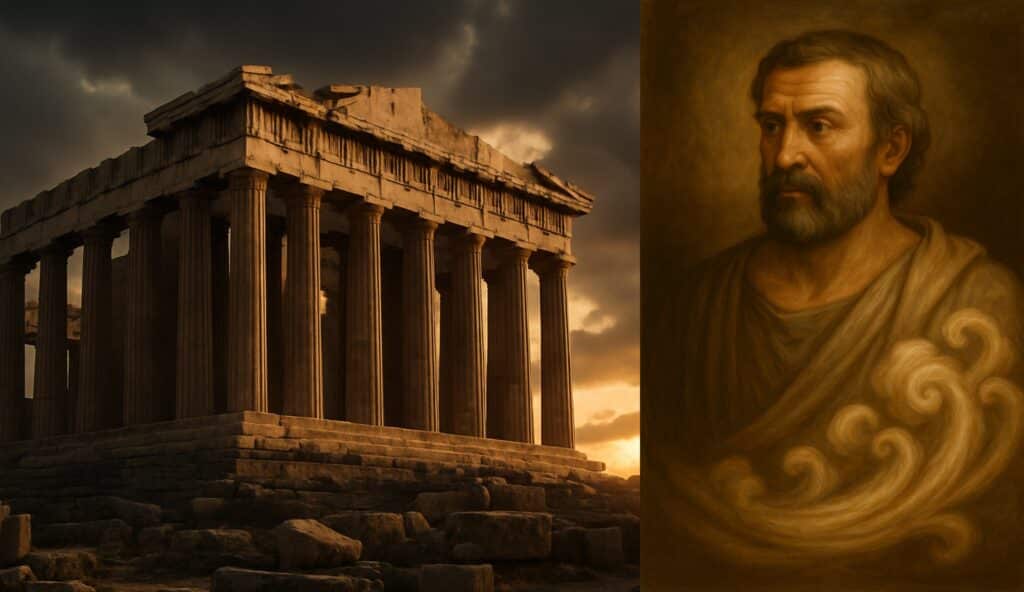

You must admire the audacity of some early Greek philosophers, like Anaximenes, because their attitude challenged the foundations of how we see and interpret the world. Forget complex equations or subatomic particles—Anaximenes, a man from the bustling ancient Greek city of Miletus on the western coast of Anatolia, looked around and said, “See all this? The ground, the sea, the fire, you, me? It’s all just air.” As simple as that. Well, sort of.
It sounds almost basic and incorrect now, but because this wasn’t just a wild guess, we can confidently say that it was a revolutionary way of thinking, which helped shape nearly everything that followed.
Picture Miletus in the 6th century BC, a thriving, noisy port on the edge of the Greek world in Ionia (now Turkey). Ideas were circulating just as much as traded goods. People were starting to question the old myths—Zeus throwing lightning bolts, Poseidon stirring up storms—and wonder if maybe, just maybe, there were other explanations for the things happening around them; natural ones.
Into this buzzing scene of intellectual curiosity steps Anaximenes. He was part of this incredible trio from Miletus—Thales thought it was all about water, Anaximander (Anaximenes’ teacher, apparently) talked about this vague ‘boundless’ stuff called apeiron. Anaximenes, though, brought it back down to Earth, or rather, back to the air around us.

Anaximenes wasn’t explicitly suggesting “poof, air becomes rock.” He had a thought process, a mechanism—and that was the true innovative element of his approach. He discussed condensation and rarefaction, essentially compressing or spreading out air. Consider this: let air become very thin and spread out (rarefaction), and it becomes hotter, turning into fire. It makes sense, right? Then, start compressing it (condensation). Initially, perhaps it becomes wind.
Pack it tighter, it gets colder, becomes clouds, then water. Keep squishing and you get earth and then solid stone. It’s almost like watching your breath fog up a cold window and turn to frost. He saw a natural process and applied it universally. So, the difference wasn’t about different kinds of matter, but just how tightly packed the same elements– air – happened to be. It was a way to explain the whole wild variety of the world with one simple substance and one understandable process. Simple yet effective.

Nonetheless, we need to be honest. Anaximenes thought the Earth was flat, like a lid, riding on air. And the stars? Fiery objects floating around up there. We know now that is not quite correct. But focusing on what he got wrong completely misses why he’s so important.
Anaximenes and his Milesian counterparts championed looking for natural causes rather than believing in centuries-old myths. No gods were needed in this process. His idea of explaining different things, like fire, water, and rock, by changes in a single underlying substance through a physical process (density changes), is foundational, even though not quite correct. It is the seed of scientific thinking: seeking unity, looking for mechanisms, and explaining the world through observation and reason rather than stories and legends. This shift from merely accepting myths (mythos) to demanding rational explanations (logos) marks a significant advancement.
Anaximenes was there, pushing it forward, opening new chapters in humanity’s scientific endeavours. Every time we try to understand the world through physics or chemistry today, we walk a path the early Greeks started clearing. It is how rational thinking was gradually born in places like Miletus, a way of approaching the world that fundamentally changed things in the following centuries.
So, next time you feel the wind, watch the clouds gather, or take a deep breath, maybe give Anaximenes a little thought. He might not have had all the answers, but he asked the right kinds of questions and showed us a new way to look for them. He dared to think that the universe wasn’t just chaotic and random, but something that could, perhaps, be understood. And that, even 2,500 years later, is still a pretty powerful idea.
